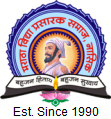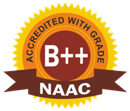Department of Biochemistry
1.Title of the practice:
Counselling and Mentoring.
Objective of the practice:
1. To develop a mentoring relationship that is characterized by mutual respect, trust, understanding and personal development.
2. To help a student to optimize an educational experience and get acquainted to a new environment.
3. To assist the progress of the student in educational as well as in socio-cultural aspect & sports.
The context:
Mentoring in a Medical College is a personal, as well as professional relationship. A mentoring relationship develops over an extended period, during which a students’ needs and the nature of the relationship tends to change. A mentor will try to be aware of these changes and vary the degree and type of attention, help, advice, information, and encouragement that a mentee needs. Several strategies to address students’ development needs like: advising, counselling, coaching and mentoring have been planned and effectively implemented.
The mentoring not only focuses on students learning and educational experiences, but seeks to connect students’ academic interest and skills with their personal and professional life. The mentoring helps to create a safe environment in which students can learn with interest, curiosity and comfort. As the students are from different cultural and socio-economic diversity, this mentorship certainly helps them to come out of the quotient and face the professional life ahead with great confidence.
The Practice:
To encourage positive student learning and outcome and for the effectiveness of the mentoring program, the following practices are followed by the department.
- Following the admission in first year MBBS, each faculty from the first year departments’ is allotted with the students as their mentee.
- These students are introduced to their mentor.
- After this primary introduction, each mentor interacts with his or her allotted mentee every month.
- In the monthly meeting, Mentee discuss their problems with the Mentor. The students are guided, counselled by the Mentor for every academic or non-academic issues.
- Monthly records for these meeting sessions are kept by the mentor. If there are any significant concerns, the matter is conveyed and discussed with the Head of the department and mentorship committee. If required, counselling session are also arranged for the mentee.
The students are also taken for a Picnic, a sort of ice-breaking as well as a stress-relieving activity for the students. Here, the mentor-mentee bond is strengthened.
This program ensures involvement of students in different programs such as career guidance, emotional and moral encouragements, soft skills development, technical knowledge enrichment, industrial visits, social awareness and participation in innovative and creative learning.
Mentorship also aims to provide objective feedback and guidance, expert talk for students motivation and overall personality developments.
Experience and Success:
This mentorship program has developed a good rapport with the students which ultimately reflects as their success in every aspect of personal and professional life.
Problems Encountered and Resources Required:
Being in a new environment, students tend to be introvert initially to discuss their psychological, social or economical considerations.
2.Title of the practice:
External Quality Assurance Scheme in Central Clinical Laboratory
Objective of the practice:
1. To ensure the Quality control for the reliable laboratory reports.
2. To ensure the proper functioning of the instruments.
3. To ensure the reliability of the reagents kits.
4. To ensure the efficiency of the technical staff.
The context:
As the biochemical laboratory parameters play an important role in the diagnosis and prognosis of the disease, it’s required to maintain the quality assurance of the results.
Though daily standardization, calibration or controls are run as a part of internal quality practice, We need to even assure the reliability of results with an external agency.
The Practice:
We always strive for the quality services. Hence every year we register to the: External Quality Assurance Scheme(EQAS), Vellore through proper protocol since 2005.
We receive the samples every month through courier which is processed in the Central Clinical Laboratory, after the reconstitution of the received sample.
This sample is processed for the various biochemical parameters and the results are emailed to the Centre.
We receive the results of this in the form of VIS which indicates the comparison of our results with other participants and channelize the changes if required. By this, any deviation or error in the technique, method or reagent kit is identified and rectified.
This ensures our strive for good quality control.
Experience and Success:
We are following this practice since 2005 and we are efficiently reporting the investigations. This gives us a direction to revert with any error in the earlier stage and ensures reliability.
Problems Encountered and Resources Required :
Sometimes the samples may not be received in time due to transport issues.
As such no specific resources are required for this practice.


